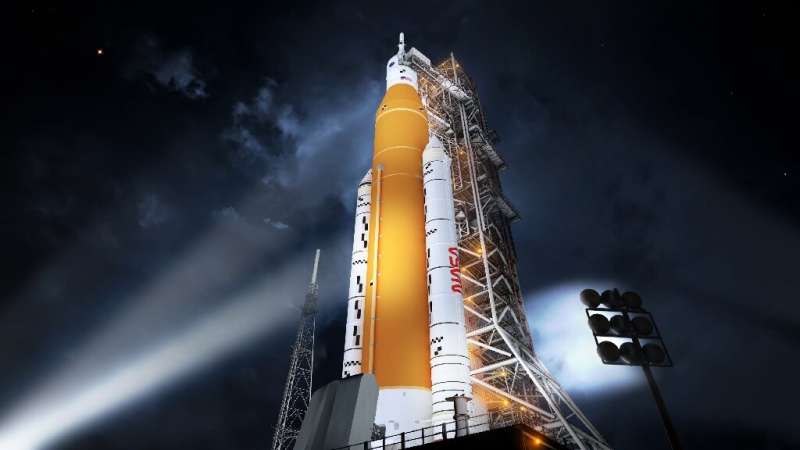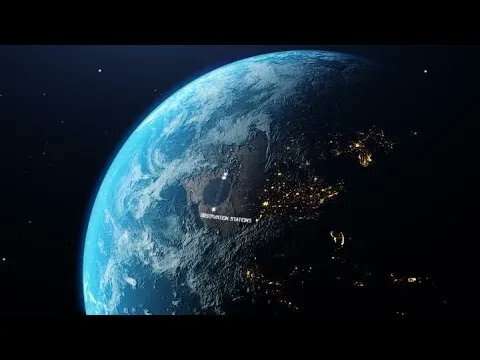
Copernical Team
Moons may yield clues to what makes planets habitable
 Earth's moon is vitally important in making Earth the planet we know today: the moon controls the length of the day and ocean tides, which affect the biological cycles of lifeforms on our planet. The moon also contributes to Earth's climate by stabilizing Earth's spin axis, offering an ideal environment for life to develop and evolve.
Because the moon is so important to life on Earth, scie
Earth's moon is vitally important in making Earth the planet we know today: the moon controls the length of the day and ocean tides, which affect the biological cycles of lifeforms on our planet. The moon also contributes to Earth's climate by stabilizing Earth's spin axis, offering an ideal environment for life to develop and evolve.
Because the moon is so important to life on Earth, scie Sols 3376-3377: Second Servings at the Prow
 The above image is a MAHLI image of a small part of the Toron block in front of the rover. Take a moment to marvel at all the details. We arrived here two sols ago and didn't drive away just yet to get some second servings. If you look closely at the image above, all the details will be telling you why we are very happy that we are able to get second servings of the Toron block.
In other w
The above image is a MAHLI image of a small part of the Toron block in front of the rover. Take a moment to marvel at all the details. We arrived here two sols ago and didn't drive away just yet to get some second servings. If you look closely at the image above, all the details will be telling you why we are very happy that we are able to get second servings of the Toron block.
In other w NASA-Funded Study Extends Period When Mars Could Have Supported Life
 The surface of Mars is barren and inhospitable, but perhaps it wasn't always that way. Billions of years ago, when life emerged on Earth, the climate of Mars could have been Earth-like as well, with a thicker atmosphere than today and oceans of liquid water. A study funded by NASA and international partners indicates this period could have lasted longer than originally thought.
"Our simula
The surface of Mars is barren and inhospitable, but perhaps it wasn't always that way. Billions of years ago, when life emerged on Earth, the climate of Mars could have been Earth-like as well, with a thicker atmosphere than today and oceans of liquid water. A study funded by NASA and international partners indicates this period could have lasted longer than originally thought.
"Our simula NASA's Artemis I moonshot slips back to April or May
 NASA announced Wednesday that its plan to launch the Artemis I SLS rocket on an uncrewed journey around the moon in March has slipped to April or May.
The space agency said it wasn't working on any "major issues" but that engineers simply needed more time.
"There's a lot of activities ... some of them are unique to our rocket and some are unique to the fact that this is an uncrew
NASA announced Wednesday that its plan to launch the Artemis I SLS rocket on an uncrewed journey around the moon in March has slipped to April or May.
The space agency said it wasn't working on any "major issues" but that engineers simply needed more time.
"There's a lot of activities ... some of them are unique to our rocket and some are unique to the fact that this is an uncrew SpaceX rocket successfully launches US spy satellite
 A US intelligence agency said Wednesday that its newest spy satellite successfully launched into orbit atop a reusable SpaceX Falcon 9 rocket.
The rocket took off at 12:27 pm local time (2027 GMT) from the Vandenberg Air Force base in California, the National Reconnaissance Office (NRO), which is in charge of the US Space Force, said in a statement.
After releasing the satellite, dubbed
A US intelligence agency said Wednesday that its newest spy satellite successfully launched into orbit atop a reusable SpaceX Falcon 9 rocket.
The rocket took off at 12:27 pm local time (2027 GMT) from the Vandenberg Air Force base in California, the National Reconnaissance Office (NRO), which is in charge of the US Space Force, said in a statement.
After releasing the satellite, dubbed NASA, Space Station Partners Approve First Axiom Mission Astronauts
 NASA and its international partners approved crew members for Axiom Space's first private astronaut mission to the International Space Station. The flight, called Axiom Mission 1 or Ax-1, is targeted to launch Wednesday, March 30, from Launch Complex 39A at NASA's Kennedy Space Center in Florida on a flight-proven SpaceX Falcon 9 rocket. The Ax-1 crew will fly on Crew Dragon Endeavour to and fro
NASA and its international partners approved crew members for Axiom Space's first private astronaut mission to the International Space Station. The flight, called Axiom Mission 1 or Ax-1, is targeted to launch Wednesday, March 30, from Launch Complex 39A at NASA's Kennedy Space Center in Florida on a flight-proven SpaceX Falcon 9 rocket. The Ax-1 crew will fly on Crew Dragon Endeavour to and fro Rocket Lab to expand Colorado dootprint with new Space Systems Complex
 Rocket Lab USA will open a new space systems complex in Littleton, Colorado to support growing customer demand for flight software, mission simulation, and Guidance, Navigation and Control (GNC) services.
The new complex expands on Rocket Lab's existing footprint in Colorado, which was established in October 2021 with the acquisition of Advanced Solutions, Inc. (ASI), an aerospace engineer
Rocket Lab USA will open a new space systems complex in Littleton, Colorado to support growing customer demand for flight software, mission simulation, and Guidance, Navigation and Control (GNC) services.
The new complex expands on Rocket Lab's existing footprint in Colorado, which was established in October 2021 with the acquisition of Advanced Solutions, Inc. (ASI), an aerospace engineer Uncrewed Artemis I mission to Moon pushed back

The first mission in NASA's program to take humans back to the Moon has been delayed until spring at the earliest, the US space agency said Wednesday, saying it needed more time to complete safety checks.
The Artemis I launch, initially scheduled for late 2021 and then postponed twice more, will now happen no earlier than April.
"Teams are taking operations a step at a time to ensure the integrated system is ready to safely launch the Artemis I mission. NASA is reviewing launch opportunities in April and May," NASA said in a statement.
Artemis I will be an uncrewed flight test, but will signal the real start of the program, which could eventually see the first woman and the first person of color to step foot on the Moon.
Astronomers lined up under an asteroid's shadow to measure its size precisely

Astronomers will go to great lengths for science. Recently, dozens of astronomers had the misfortune of traveling to one of the most tempting locales in the southwestern U.S.—Las Vegas. But they weren't there for the city's bright lights—they were there to observe the very dim light of a star thousands of light-years away. And what they specifically wanted to see was the light from that star blink out for a few seconds. That lack of light provided the exact data they needed to help them determine the size of Eurybates, one of the Trojan asteroids that will be the focal point of NASA's Lucy mission.
What the scientists were looking for was an occultation. Most people know the most common form of this phenomenon—an eclipse. But occultations can happen with any background star and can be caused by any foreground object. Calculating where these minor occultations of stars by asteroids will occur takes a significant amount of orbital mechanics and processing power. The Earth itself has to be aligned correctly, and the asteroids and stars have to line up just right and be big enough.
Incoming! Debris enroute to the Moon

The Moon is set to gain one more crater. A leftover SpaceX Falcon 9 upper stage will impact the lunar surface in early March, marking the first time that a human-made debris item unintentionally reaches our natural satellite.
